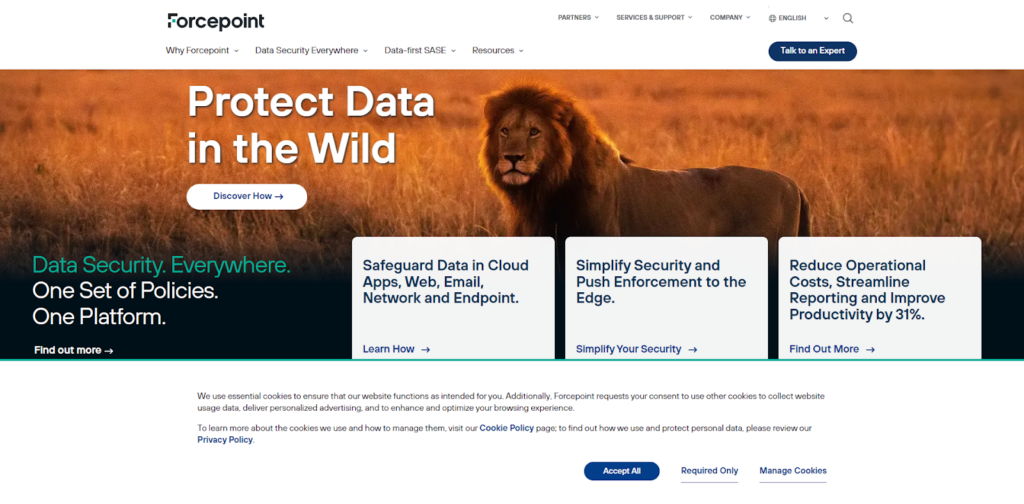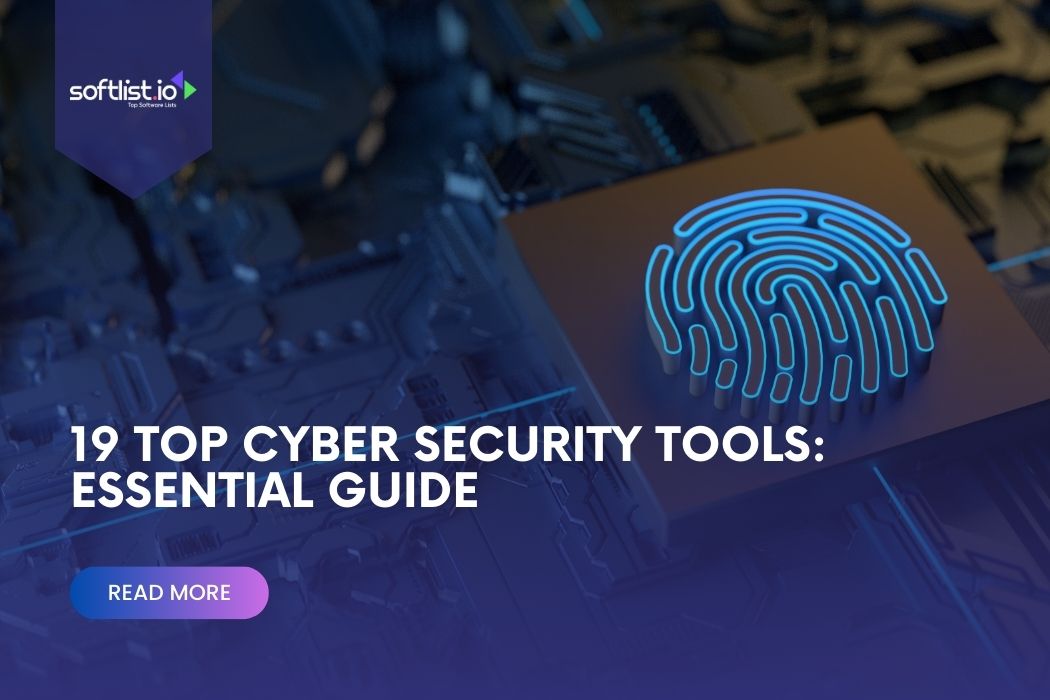As digital risks change all the time, cybersecurity tools are the first line of defense. They protect information security and make sure that networks and systems are fully secure.
These tools, which include basic antivirus software and more complex security information and event management (SIEM) systems, help you keep track of security risks and defend you from many types of security dangers. They are very important for people who work in hacking because their job is to keep everything safe and honest in a world that is becoming more and more hostile online.
This article explores the various types of cybersecurity tools, their functionalities, and why they are indispensable in today’s tech-driven world. Let’s hop in!
What Are Cybersecurity Tools?
Cybersecurity tools are essential software and hardware solutions designed to protect and secure digital environments from potential threats and vulnerabilities. These tools play a crucial role in safeguarding information security across various platforms, including computer security and network systems.
By detecting suspicious activities, mitigating cybersecurity risks, and managing security effectively, these tools help ensure the overall security of both private and organizational data.
They range from antivirus software to complex security information and event management (SIEM) systems and are used by cybersecurity professionals to perform security assessments, monitor network traffic, and enhance security layers.
What Do Cybersecurity Tools Do?
Cybersecurity tools like Nmap, a free network scanner, and other free cybersecurity tools perform a variety of critical security tasks. They scan web applications to identify security holes, act as packet sniffers, and help manage layered security strategies.
From open-source penetration testing applications to comprehensive security solutions offered by cybersecurity companies, these tools provide an essential defense against a wide range of security threats. They are especially vital for security administrators and cybersecurity teams that rely on them to uphold cybersecurity best practices and protect sensitive data.
Top Cyber Security Tools
Nmap
Source: Nmap
Nmap, or Network Mapper, is a powerful tool used by cybersecurity professionals to scan networks and identify vulnerabilities. It operates on various operating systems, making it versatile.
Nmap is essential for assessing the security posture of network infrastructure. It can discover devices on a network, determine open ports, and detect security risks. This free, open-source tool is a staple in the cybersecurity toolkit.
- Network discovery quickly identifies all devices connected to a network.
- Port scanning: enumerates open ports on networked devices.
- OS detection: determines the operating systems of scanned devices.
- Version detection: identifies application versions on target machines.
- Scriptable interactions: Allows automated tasks with NSE scripts.
Paros Proxy
Source: Paros Proxy
Paros Proxy is a robust web application security testing tool. It acts as a proxy server to intercept and modify traffic between users and the web, allowing for thorough security testing.
Paros is effective for spotting vulnerabilities in web applications. It offers real-time analysis and is an excellent educational tool for those learning about network security. Its intuitive interface and powerful features make it popular among security professionals.
- Interception and editing of traffic: Modify requests and responses.
- A real-time scanner identifies vulnerabilities as they occur.
- User-friendly interface: easy for beginners and professionals.
- Integrated spider: maps out visible and hidden resources.
- Multi-platform support: runs on various operating systems.
POf
Source: POf
POf, or passive operating system fingerprinting tool, is a network monitoring tool used to identify the operating systems of devices in network traffic without active scanning. This cyber security tool operates by analyzing packets passively, making it stealthy and non-intrusive.
It’s used to enhance network security through better awareness and is highly valued in intrusion prevention strategies. POf supports various platforms, offering flexibility in deployment.
- Passive detection: no direct interaction with targets.
- Lightweight: minimal impact on system performance.
- Operating system identification: pinpoints OS types from traffic.
- Stealth operation: Avoids detection by network security measures.
- Cross-platform compatibility: functions on multiple operating systems.
Burp Suite
Source: Burp Suite
Burp Suite is a comprehensive cybersecurity tool for testing web application security. It intercepts traffic between a browser and a server, allowing users to analyze and modify requests.
Burp Suite offers automated and manual tools to identify vulnerabilities, making it indispensable for security audits. Its rich feature set supports detailed analysis and customization to suit professional needs, securing its place in the market as a top choice for web application security.
- Intercepting proxy: controls web traffic for analysis.
- Advanced scanning automates the discovery of security weaknesses.
- Extensive plugin support: enhances functionality with add-ons.
- Detailed reporting: Provides comprehensive vulnerability reports.
- Customizability: tailored testing to fit any security need.
KeePass
Source: KeePass
KeePass is a secure, open-source password manager that helps users manage their passwords in a secure database. It’s widely used by individuals and businesses to protect against cyber threats associated with password theft.
KeePass encrypts its database with the most advanced cryptographic algorithms, offering robust security. The tool is completely free, making it accessible to everyone concerned about their cyber security.
- Strong encryption: uses AES and TwoFish encryption algorithms.
- Cross-platform: Available for multiple operating systems.
- Portable: No installation is required; it can run from a USB.
- Customizable: Extensive options to tailor to user needs.
- Open-source: transparent and free for personal and commercial use.
Nagios
Source: Nagios
Nagios is a powerful network monitoring cybersecurity tool that helps organizations monitor their systems, networks, and infrastructure. It alerts users to potential problems before they affect critical business processes.
Nagios is renowned for its comprehensive reporting capabilities and its ability to integrate with a vast array of hardware and software. It’s a vital tool for maintaining the health of IT environments and ensuring uptime and operational efficiency.
- Real-time monitoring: tracks system health continuously.
- Alerting mechanism: Notifies of issues for immediate response.
- Comprehensive reporting: detailed insights into system performance.
- Extensible: A wide range of plugins and add-ons are available.
- Multi-user access: Allows different levels of access control.
Nexpose
Source: Nexpose
Nexpose is a vulnerability scanner that helps businesses identify and mitigate risks in their networks, operating systems, and applications. It integrates seamlessly into any security posture, offering real-time exposure management.
Nexpose scans for security vulnerabilities evaluate them, and provide detailed remediation steps. Its dynamic approach to security helps organizations stay ahead of cyber threats, making it a staple in cybersecurity arsenal.
- Real-time risk assessment: updates as new threats emerge.
- Threat prioritization: focuses efforts on critical issues.
- Integrated risk management aligns with security frameworks.
- Scalable architecture: adapts to small and large environments.
- Comprehensive coverage: scans a wide range of assets.
Aircrack-ng
Source: Aircrack-ng
Aircrack-ng is a suite of cybersecurity tools aimed at assessing WiFi network security. It focuses on areas like monitoring, testing, and cracking WiFi networks to identify vulnerabilities. This tool is popular among cybersecurity professionals for penetration testing and network audits.
Aircrack-ng operates mainly through the command line, providing powerful and precise capabilities to detect network security flaws, making it an essential part of strong cybersecurity efforts.
- Packet capture and export: captures WiFi packets effectively.
- Support for multiple OS: Works on Linux, OS X, Windows, and more.
- WEP and WPA/WPA2-PSK cracking: tests and cracks WiFi security.
- Monitoring mode: Tracks WiFi networks in real time.
- Extensive documentation: Offers detailed guides and tutorials.
Forcepoint

Source: Forcepoint
Forcepoint is a leading security platform offering a variety of tools designed to protect users, data, and networks from threats. It integrates advanced threat protection, data security, and endpoint security under one roof.
Forcepoint’s solutions are tailored to meet the specific security needs of businesses, helping enforce security standards and best practices in cybersecurity. It’s a strategic asset for any organization aiming to bolster its cybersecurity strategy.
- Advanced threat protection: guards against complex cyber threats.
- Data loss prevention: secures sensitive information effectively.
- Cloud security solutions offer robust protection for cloud environments.
- Behavioral analytics: detects anomalies based on user behavior.
- Comprehensive visibility: provides detailed insight into network activities.
Splunk

Source: Splunk
Splunk is a powerful cybersecurity tool that turns machine data into valuable insights to improve business operations, cybersecurity, and more. As a premier analysis tool, Splunk processes and visualizes large amounts of data to identify patterns, problems, and trends.
This platform supports cybersecurity efforts by monitoring, searching, and analyzing real-time and historical data, making it indispensable for informed decision-making and better security.
- Real-time processing analyzes data as it comes.
- Customizable dashboards: tailor views to specific needs.
- Advanced search capabilities: it retrieves and correlates information quickly.
- Data visualization offers clear data representation.
- Scalable infrastructure adapts to small and large enterprises.
NetStumbler
NetStumbler is a cybersecurity tool designed to detect wireless networks and assess their performance and security configurations. It is particularly useful for locating open ports and identifying unsecured networks, which are common security vulnerabilities. NetStumbler’s user-friendly interface makes it accessible for both amateurs and professionals, making it a popular choice for anyone involved in network testing or monitoring for security vulnerabilities.
- Wireless network detection: identifies WiFi networks within range.
- Signal strength indication helps optimize network performance.
- GPS integration maps network coverage and location.
- SSID broadcasting: detects whether networks are hidden or visible.
- Compatibility with Windows: Designed specifically for Windows users.
KisMAC
KisMAC is an open-source WiFi network discovery tool designed for Mac OS X. It offers deep scanning functionality, unlike typical WiFi scanning tools, allowing it to uncover hidden networks and collect extensive data on network security.
KisMAC supports various WiFi cards and drivers, providing detailed information about captured packets and network encryption, aiding in the enhancement of wireless security.
- Deep scanning detects even hidden networks.
- Support for multiple WiFi devices: Compatible with many WiFi cards.
- Graphical mapping: a visual representation of network topology.
- Passive and active scanning: offers flexible scanning capabilities.
- Network filtering: focuses on specific networks for analysis.
Tcpdump
Tcpdump is a robust packet sniffer used by cybersecurity experts to monitor and log network traffic. This command-line tool captures and displays the packets being transmitted or received over a network interface.
Ideal for troubleshooting network issues or auditing network security, TCPdump is a critical tool in cybersecurity practices. It supports a wide variety of network types and protocols, making it versatile for different security needs.
- Lightweight and powerful: efficient use of system resources.
- Wide protocol support: handles all major network protocols.
- Flexible filtering options: focus on specific traffic.
- Open source: freely available and continuously improved.
- Command-line interface: Offers precise control over operations.
Nikto
Nikto is a web server scanner that identifies security flaws and vulnerabilities in web applications. It is primarily used by security teams to evaluate security risks and monitor web app security effectively.
Nikto performs comprehensive tests against web servers, checking for outdated versions of software and harmful files. It is one of the best cybersecurity tools for detecting potential security issues on web servers.
- Scans for thousands of vulnerabilities
- Detects outdated software versions
- Check for misconfigurations.
- Supports SSL connections
- Easily integrates with other security tools
Wireshark
Wireshark is a network protocol analyzer that allows security professionals to capture and interactively browse the traffic running on a computer network. It is crucial for security monitoring and troubleshooting network security issues.
Wireshark provides deep visibility into network activities, helping to identify and analyze security incidents and cyber threats. It’s one of the most widely used network security monitoring tools available.
- Captures real-time packet data
- Deep inspection of hundreds of protocols
- Live capture and offline analysis
- Rich VoIP analysis
- Graphical and textual packet information
John the Ripper
John the Ripper is a powerful password-cracking tool used by security professionals to test password strength within their organization. It supports numerous encryption tools, making it a versatile choice for breaking complex passwords.
This tool is effective in revealing security flaws in password management and is a vital component of any robust cybersecurity program. Its ability to adapt to password hash types and encryption algorithms makes it a formidable tool against cyber threats.
- Supports many hash and cipher types.
- Auto-detects password hash formats
- Customizable cracking modes
- Available on multiple platforms
- Extensible with community-enhanced versions
Metasploit
Metasploit is an advanced framework for developing, testing, and executing exploits. It is primarily used by cybersecurity experts to test security defenses and evaluate the impact of security flaws on systems.
Metasploit provides a comprehensive development environment for cybersecurity professionals, making it a cornerstone of cybersecurity solutions. This tool also aids in simulating security incidents to prepare better security responses.
- A wide range of exploit modules
- Automated exploit tools
- Extensive payload collection
- Integration with other security software
- Command line and GUI interfaces
Cain and Abel
Cain and Abel is a password recovery tool for Microsoft operating systems. It allows security teams to recover various types of passwords using techniques such as packet sniffing and cracking encrypted passwords using dictionary, brute-force, and cryptanalysis attacks.
Cain and Abel is known for its ability to handle a variety of encryption standards and is a useful tool for network security monitoring and auditing security vulnerabilities.
- Recovers many password types.
- Supports network packet sniffing.
- Conducts cryptanalysis attacks
- Reveals hidden passwords
- Intuitive user interface
Kali Linux
Kali Linux is a Linux distribution designed for digital forensics and penetration testing. It is equipped with numerous tools for hacking and security testing. Kali Linux is the go-to environment for cybersecurity experts due to its extensive collection of security tools and its ability to run on a variety of devices.
This platform is integral to the cybersecurity strategies of many organizations, helping them identify and mitigate security risks.
- Pre-installed with cybersecurity tools
- Wide hardware support
- Customizable to specific needs
- Active developer community
- Supports wireless devices
Final Thoughts
Cyber threats are always changing, making strong cybersecurity tools essential. Free and open-source options not only boost your security skills but also help even small organizations beef up their defenses. As tech evolves, staying on top of new threats with the best tools is key to keeping your data safe.
Free and open-source cybersecurity tools provide valuable resources for security training and allow even small organizations to strengthen their cybersecurity posture. As technology advances, investing in top cybersecurity tools and staying informed about new and emerging threats is paramount for maintaining a strong defense against cyber risks.
Are you curious about what tools are out there? Check out our other posts on data security services that dive into the must-have software that won’t cost you a dime. Check it out to ensure you’re well-equipped to protect yourself from cyber risks.
FAQs About Cybersecurity Tools
What are the most essential cybersecurity tools every organization should have?
Every organization should have antivirus software, a reliable security scanner, and tools for network intrusion detection to safeguard their digital assets.
How do cybersecurity tools manage security within an organization?
These cybersecurity tools monitor for suspicious activities, conduct regular security assessments, and ensure that all security layers are robust and updated.
Can small businesses afford effective cybersecurity tools?
Yes, many effective cybersecurity tools are available for free or at a low cost, making them accessible for small businesses looking to enhance their security.
What is the role of open-source tools in cybersecurity?
Open-source tools play a crucial role in cybersecurity by providing access to high-quality security solutions that are often customizable and continuously improved by the community.
How often should cybersecurity tools be updated?
Cybersecurity tools should be updated regularly to ensure they can protect against the latest threats and incorporate the most recent security advancements and patches.






